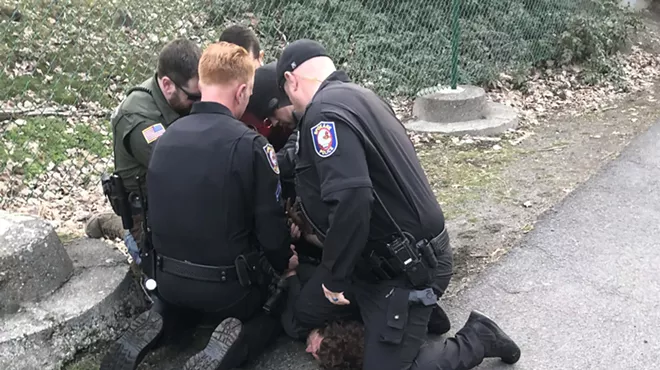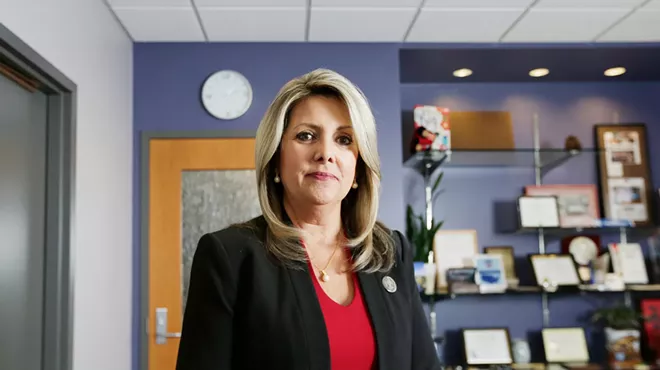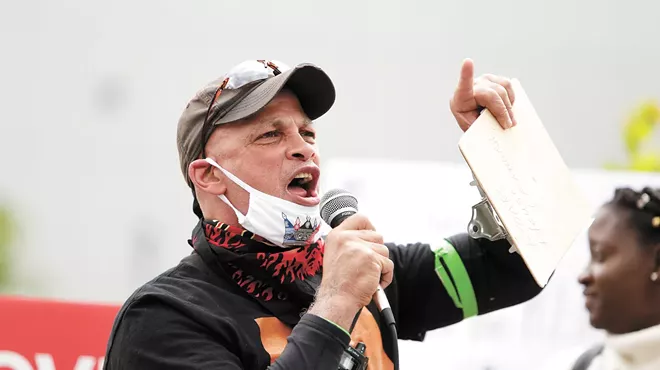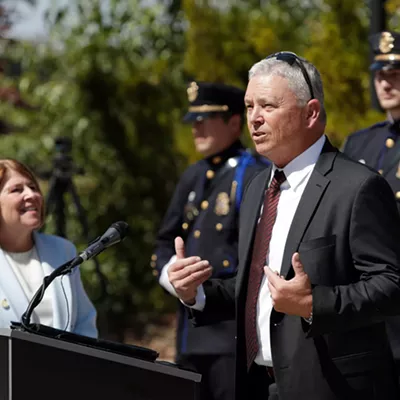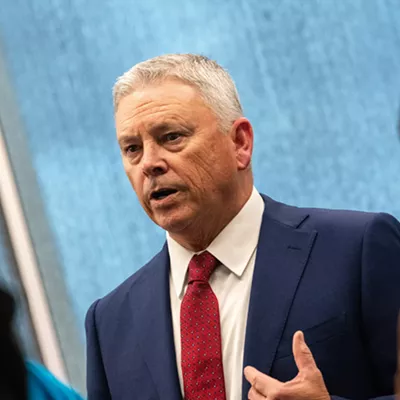
To say it was a volatile moment was an understatement. It was June 2020, one week after Spokane's George Floyd protest turned destructive. Windows of some downtown businesses had been broken. Police had declared a riot and lobbed tear gas. Both the police and the protesters were on edge.
It was in this environment that someone called Spokane police alleging that two Black teenagers had pointed a gun at them. When police responded, they ended up searching the 14-year-old son of Sharon Randle, the then-vice president of NAACP, and his friend. They didn't find a gun.
Outraged, Randle tagged Chief Craig Meidl on Facebook, alleging that one of his officers had pulled a gun on his son and his friend.
"My son was almost the next victim because of some Karen calling the police on two black boys minding their own business walking down the street!!!" she wrote in the post, which also tagged multiple local Black community leaders. "I will be filing a complaint!!! And this is why we march, protest and riot!!! #BlackLivesMatter."
Meidl responded directly to the allegations on Facebook.
What happened over the next several months resulted in Randle getting booted from the NAACP, two citizen complaints being sent to the police ombudsman, Spokane's director of Human Resources concluding Meidl had damaged the police department's reputation, and the chief writing an impassioned and indignant response, claiming he was a target of the "'cancel culture' we see so often these days when the truth is spoken."
"Trying to "cancel" me... is a tactic we have become all too familiar with over the past couple years," Meidl wrote in a March 2021 letter to the city's HR director.
Now, as the release of video footage showing police brutality in Memphis has sparked another round of debate about law enforcement's role and potential reforms, it's worth examining the incident and how Meidl's strategy of responding to detractors has gone wrong — and gone right — in the past.
Last week's cover story focused on elected officials struggling to figure out the best way to respond to their critics and "trolls." But in some ways, it's even trickier for high-profile unelected officials to respond.
"As an elected official, Ozzie has a lot more liberty to do things that I do," Meidl says.
Former Spokane County Sheriff Ozzie Knezovich had a famously combative reputation, waging war on critics in both press conferences and, at times, on social media. Meidl, by contrast, has a reputation as being much more cautious. In 2019, City Council President Ben Stuckart praised Meidl for his agility in threading a complicated political needle, calling Meidl "much more careful in his words" than, say, the city's fire chief, Brian Schaeffer.
But in this case, Meidl did wade into the fray of a complicated situation, using his Facebook account to respond directly on Randle's Facebook page.
"Sharon, the officers did not point their guns at your children," he wrote. "They did not even take them out of their holsters."
While Randle disputed Meidl's account, Meidl insisted that his sergeant had body camera footage proving it.
"What's your reason for posting this instead of calling me and getting what actually happened?" Meidl said.
In another comment, he said he had personally talked to one of the officers involved.
"Happy to look at the body camera footage with you next week, or I'll go with you to the station right now and meet you there so we can watch it," Meidl said.
But Randle didn't take Meidl up on that offer. Meanwhile, other commenters in the thread took issue with the chief's decision to respond personally on Facebook, arguing they had no reason to trust the department. Two commenters submitted a complaint to the police ombudsman complaining about Meidl's Facebook behavior.
"Chief Meidl commented in a dismissive manner and chastised this mother publicly for not calling him," one complaint said.
The other complainant argued that Meidl's Facebook comments were an "extreme form of constitutional oppression," and claimed to have witnessed "not only berating a terrified mother for not keeping quiet about a clearly racist police incident in which your city's officers pulled guns on her unarmed black teenage child, but then called her a liar, because trying to kill her child wasn't enough human atrocity for one day."
If the ombudsman didn't do anything about it, the complainant declared, "you will have failed your city and failed as a human being, and this shame will haunt you. Or it won't haunt you, and we'll all know exactly where you stand (with racists, bigots and murderers)."
The police ombudsman, however, doesn't have the authority to handle complaints against the police chief. Instead, the issue got forwarded to the Human Resources department. It took nine months for the department to come to a decision.
The conclusion wasn't complimentary of Meidl.
While Amber Richards, who was the director of the Human Resources department, concluded that Meidl's response didn't constitute "general harassment," she wrote it "demonstrated a lack of etiquette, situational awareness, emotional intelligence, and professional maturity.”
She concluded that he'd run afoul of the City of Spokane's social media policy, having “compromised and/or damaged the mission, function, reputation, and professionalism of the Spokane Police Department.”
Richards recommended that the city administrator give Meidl counseling and coaching "regarding appropriate executive leadership behavioral competence, and his obligations to uphold the public trust by setting the highest example of behavior and conduct."
The Inlander stumbled across the result of the inquiry in an unrelated records request.
But Richards' report left an important part of the story out. Meidl was generally right when he described the incident.
Video footage can incriminate cops — as it did in Memphis with Trye Nichols' death and as it did in Spokane with the beating of Otto Zehm — but it can also exonerate them.
Crucially, posting on Facebook wasn't the only way Meidl worked to handle the accusation. He also contacted Kurtis Robinson, the president of the NAACP, and offered to show the group the body camera footage.
Robinson asked two of the other members of the NAACP leadership, Kiantha Duncan and Le’Taxione, to review the body camera footage of this incident and another incident and report back to their executive committee.
"What we tried to make sure we do is to make sure we find out what’s the truth," Robinson says. "They had confirmed, not everything that Meidl said, but a lot of it."
Indeed, it showed that at no point did the officer's gun leave his holster.
Ultimately, Randle was booted from her NAACP leadership role. While Robinson declines to get into details, he confirms "it was this issue that got Sharon Randle removed." Randle did not respond to an email and Facebook message for comment.
Asked about the incident, Meidl says he totally understands why there's the general principle against arguing with citizens in Facebook comments.
"I think Abraham Lincoln said something similar: If I spend all the time responding by critics, I would never have time to get the job done," he says.
But in this instance, he made the right call, especially with the risk that a false claim could make national news.
"I had at minimum an obligation to say, here are the objective facts,” Meidl says now. "It's like: What's the impact if I allow this to go unchecked?"
Far from damaging his department's reputation, he wrote, he had "refused to allow untruths to damage the mission, function, reputation and professionalism of SPD."
He wrote that the footage showed the officer's response to be "friendly and professional" and that if anything, the pat-down they conducted was too cursory for the seriousness of the call.
He also took time to rebut the complaints themselves.
"I was hardly 'berating a terrified mother' by posting the facts of what the body camera revealed," Meidl wrote, adding that "if speaking truth to lies is 'constitutional oppression' then we have fallen further than I realized as a country."
In his conclusion, Meidl delivered something like a mission statement.
"When I was chosen as the Chief over four years ago, I told the community I will hold our officers accountable regardless of how popular or unpopular it may be internally," Meidl wrote, "and I will defend our officers regardless of how popular or unpopular it may be in the community."
City Council President Breean Beggs was wary about weighing in on a story about city discipline.
"As someone who gets lots of criticism online, I understand the urge to share the facts of a situation," Beggs wrote in an email. "I personally find communicating conflict via social media to be generally unproductive and understand the administration's desire to limit it by people under its supervision."
Local police critic Jim Leighty argued that Meidl should have learned from "Knezovich's blunders."
"Responding to the public on social media should be well-thought-out and probably shouldn't be barbed when coming from a position that is supposed to be a position of respect and authority," Leighty wrote.
Robinson, while he says there's room for improvement ("let's create a dialogue, instead of having a Facebook media fight"), argues that Meidl's overall approach was far far better than Knezovich's tactics of holding press conferences to decry activists.
The chief reached out directly. The NAACP took "immediate action."
"That’s a very healthy way to proceed," Robinson says. "The approach that Chief Meidl used in that situation was so good. It was on the trajectory that we as a human family embrace and like to see."
It's not the first time. Meidl has had one-on-one sit-down conversations with some of the department's most fervent critics, like Leighty and policing critic Anwar Peace. Before the body camera footage from Memphis was released last week, Meidl reached out to multiple Black community leader and activists, including Peace, Duncan and Robinson to talk about how to proceed.
"I thought it was great," Robinson says. "I applaud and appreciate it for what it was. I said 'It’s been a little while'."
If anything, Robinson says, there should be more outreach like that. He says he pressed Meidl on why he there'd been "radio silence" during a lot of the other incidents in the last three years. But he also feels that simply talking is not enough.
Some of the activists who commented for this article said they left their one-on-one conversations feeling listened to by Meidl only to feel like they'd just been "placated" when little changed.
This week, the community roundtable discussions, which had started in the wake of the 2020 protests, collapsed, with local activists and advocates feeling frustrated by the slow pace of progress. Police spokeswoman Julie Humphreys points to reforms and changes in the last three years — including updates to virtual training programs and the implementation of the Behavior Health Unit — and says that the chief's outreach to those critical of the department has been genuine.
But Robinson echoes the frustrations of other activists. Community conversations are comparatively easy. Institutional change is hard.
"People in the places of power have a hard time surrendering some of that power," Robinson says. "They want you to come to the table to talk. They say they have the intent to do something, until it’s time to do something." ♦

